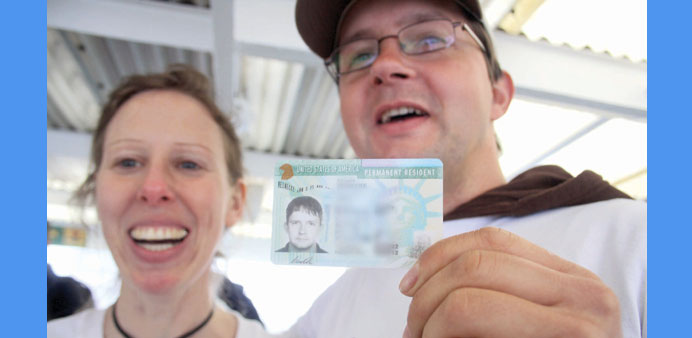HAPPY TO BE HERE: Nicola Franz, left, and her husband Jan Meinecke, who is holding up the Green Card he won. They were on a New York tour boat, taking a trip to celebrate rising to the top in the immigration lottery.
By Christina Horsten
Saturday afternoon and it is raining. The dark grey waters of New York’s Hudson River slap against the excursion boat’s hull.
“Welcome to America’s favourite boat trip,” a voice from the speakers says. The passengers are settling into their seats, folding up their umbrellas and slowly getting to know each other. “When did you win?” they get asked.
Since the 1990s, the United States has every year given away 55,000 Green Cards, which entitle the holder to live and work in the US permanently. There are national quotas, as the scheme was originally launched to get more immigrants into the United States from certain countries.
Every year around 13 million people worldwide enter the lottery in which the Green Cards are distributed.
Numerous agencies offer to help hopefuls fill out the complicated application form. On this grey Saturday afternoon one of them is giving a dozen of its winners a boat tour around Manhattan.
The price tag is still stuck on Qaush Mujaj’s umbrella. The 46-year-old is from a small village in Kosovo. He entered the Green Card lottery eight times before he won in 2010. Today he works seven days a week for a Kosovan painting and decorating company in New York.
“Only two or three of us are illegal,” he says.
They specialise in working for the richest of the rich, adding gold leaf to the ceilings of penthouses and whitening cabinets that hold Oscar statues.
“I have not had much time to see the city. This is my first time on a ship, my first time on such a tour,” says Mujaj, looking through the rain at the Statue of Liberty. “As a tourist it is beautiful. But living here is a harder struggle.” Still he intends to apply for US citizenship as soon as possible.
Two rows behind him sit Germans Nicola Franz and Jan Meinecke. He wears a New York Yankees baseball cap. The couple met in Germany in 2011 and shortly afterwards Jan won a Green Card on the 10th attempt.
His sister lives in the US state of New Jersey and he was determined to go join her.
It was a harder decision for Nicola. She had recently separated and moved house. On the day her new fitted kitchen arrived for her German apartment, she decided to emigrate to the United States instead.
“I was certain: this is the man.”
The following weeks were a roller-coaster ride of going to the registry office to marry, packing their furniture in a shipping container and telling their surprised families about their plans.
Today, they live in an old wooden house deep in New Jersey. Deer and black bears forage through their garden and the couple make their own bread and cheese. Meinecke is a software engineer and Franz, formerly a bank clerk, works as a parking attendant, her first job after months of searching.
“I don’t miss Germany,” says Meinecke, “even though you have to give up a lot of quality of life to come here. This country is quite unsophisticated. But the people are nicer.”
The river boat passes Inwood, the northern tip of Manhattan. The Green Card winners pose for a group photo, proudly holding their plastic cards up for the camera. Most of them had entered the lottery many times before they won. For a European the chances of winning a Green Card are between 1 and 2 per cent.
Winning doesn’t necessarily make life easier. The card doesn’t guarantee a job and money, just the chance to fulfil the dream of living and working in the United States.
The Green Card lottery is not without its US critics. They argue that the programme brings poorly educated immigrants, security risks and people who have no relationship with the American way of life into the country.
“A lottery is not a good way to organise an immigration system,” Stephen Yale-Loehr, a professor at Cornell University, told the Wall Street Journal. “It doesn’t strengthen family bonds, it is not conducive to our economic interests and it doesn’t rescue any refugees. Congress should abolish the programme.”
If broad immigration reform is discussed in the coming years, the lottery is likely to be hotly debated and some observers believe it won’t survive.
Vico Zabel is one of the lucky ones — he already has his Green Card. He can thank “Matlock” for his US fever. It was an American crime show he watched as a child growing up in eastern Germany. The 33-year-old graphic designer who lives in New York says he is homesick but doesn’t plan to leave the United States.
It’s the same story with another German, Angela Roth from Frankfurt.
She has lived for a year in a woman’s dormitory in the fashionable Upper East Side of Manhattan. She pays $880 (730 euros) a month for an 8-square-metre room.
After a four-hour tour in driving rain, the boat is docking at its pier in south-western Manhattan. Conny Albrecht, a civil engineer from Kiel in Germany, says that when he gets homesick, he brings himself a little bit of Germany home.
Once he missed mettbroetchen so much that he brought home the raw meat from the butcher’s. His American girlfriend was not impressed: “She was totally disgusted by the raw meat and disinfected everything at once.” — DPA

